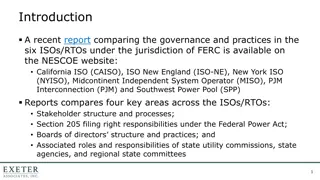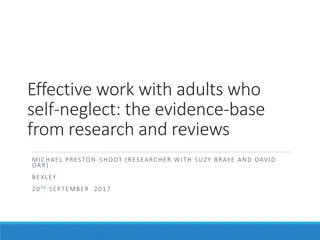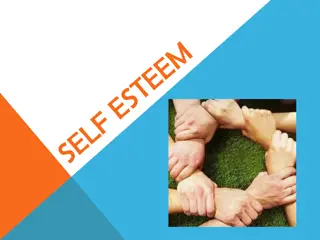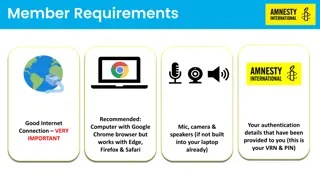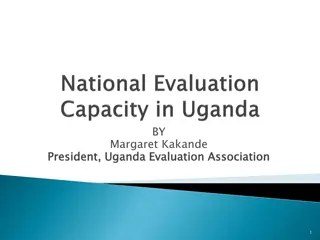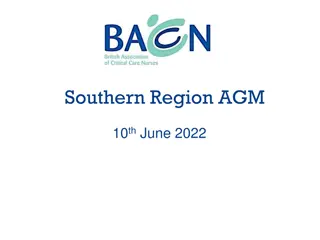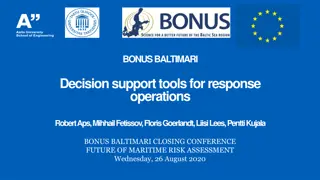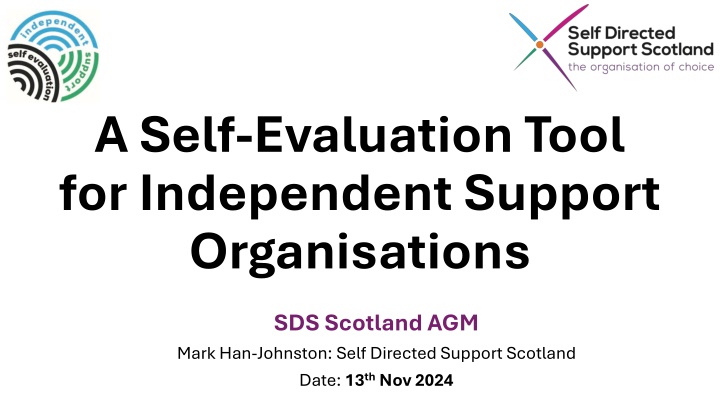
Empowering Independent Support Organizations through Self-Evaluation Tool for SDS Scotland AGM
Enhance your organization's impact with a self-evaluation tool designed to support SDS in Scotland. Learn about the aim, importance, and benefits of self-evaluation as part of the SDS Improvement Plan 2023-27. Explore the Appreciative Enquiry approach and the significance of evaluation in achieving desired outcomes.
Uploaded on | 2 Views
Download Presentation

Please find below an Image/Link to download the presentation.
The content on the website is provided AS IS for your information and personal use only. It may not be sold, licensed, or shared on other websites without obtaining consent from the author. If you encounter any issues during the download, it is possible that the publisher has removed the file from their server.
You are allowed to download the files provided on this website for personal or commercial use, subject to the condition that they are used lawfully. All files are the property of their respective owners.
The content on the website is provided AS IS for your information and personal use only. It may not be sold, licensed, or shared on other websites without obtaining consent from the author.
E N D
Presentation Transcript
A Self-Evaluation Tool for Independent Support Organisations SDS Scotland AGM Mark Han-Johnston: Self Directed Support Scotland Date: 13thNov 2024
Why are we doing this? Self-Directed Support Improvement Plan 2023-27 4.3.3 Consider and develop ways in which the SDS framework of standard may be adapted and used by ISOs to build on improvement of SDS across the whole system. You can see the SDS Improvement Plan here
The Aim: Is to produce a Self-evaluation Tool for Independent Support Organisations supporting people to access SDS That is: Relevant Useful Accessible to all types of Independent Support Organisation Can be adapted to whatever Outcomes people are working to Can be improved over time as people use it Supports quality and consistency
Why a Self Evaluation Tool? There are a number of quality assurance and self-evaluation tools already available to help people assess the impact of their work and to make changes on this basis. However, we wanted a specfic tool that would support the work of organisations, groups and individuals who are supporting people to access Self-directed Support (SDS), for themselves or the person they care for. A tool would be a resource that could be used to: improve awareness of the need for support provide evidence of the impact of support enable gaps to be identified supports future service planning, delivery and funding identify and record good practice
The Appreciative Enquiry approach Adopting a learning approach The aim of a learning approach to evaluation is for people to build this into their daily and weekly practice to help gather and build evidence about that practice. Instead of self-evaluation being a process of audit and inspection, which happens at specific times, a learning approach requires a continuous process of sensing and responding .
Evaluation and Self-evaluation
Evaluation What is it and why is it important? Evaluation: Is the process of measuring the impact of an action you ve taken This impact is measured against a standard you have set yourself (something you want to achieve eg your Outcomes) It is about gathering relevant information to help you measure Key elements include: Identifying what you re trying to achieve (Outcomes) Gathering relevant information to help you measure how well you ve met what you want to achieve Identify areas for improvement and make changes on this basis
Self-evaluation What is it and why is it important? Self Evaluation: Self-evaluation is a process of reflection, learning and change It enables people to adapt and change their approach, based on that learning It enables people to identify the impact they are having Key elements include: Increasing one s self-awareness Understanding the impact of one s actions on other people Being able to reflect on experience and make use of this Being able to recognise information that helps you assess your impact Knowing how to use this information to achieve specific Outcomes Being open to change and being open to feedback
What Evaluation work do you do at the moment? What do you evaluate? How do you evaluate? Is there any element of self-evaluation? What do you learn? What do you do with the information? How does this help you develop?
Focusing on SDS Standard 1
Standard 1: Independent Support, Community Brokerage and Advocacy Standard 1 description: People are offered independent support, community brokerage and advocacy to have choice and control over their own or their child s social care and support, and to exercise their human rights. Within Standard 1, there are 6 Core Components. These refer to specific standards that relate to the planning, funding, support and delivery of Independent Support for SDS. These are expectations that anyone needing support and their carers can have. Community Brokerage is now explicitly written into the Standard
What are the 6 Core Components
The 6 Core Components: 1.1 The right to independent support for those who need it is upheld 1.2 People feel confident independent support is right for them and is tailored to their needs with specialist provision being available for specific vulnerable groups 1.3 Independent support addresses communication barriers 1.4 Independent support is provided as early as possible and for as long as is needed 1.5 Independent support enables people to identify outcomes and to help to inform or co-produce the person s plan. 1.6 Independent support operate within clear frameworks and guidelines to ensure consistent practice throughout Scotland
Other background Information
Other areas that are included in the Tool To cover what Self Directed Support is To cover the Supported Persons and Carers Journey through SDS To identify what Personal and Organisational Outcomes are To relate these Outcomes to Evaluation information
Which of the 6 Core Components would you like to focus on?
Identifying Self-evaluation information What type of information would you need to tell you if you are achieving the expectation of this Core Component? Can we list examples of this information? This could include information on the impact of your service? (eg feedback) This could be about a specific stage in the SDS journey This could be about certain Personal Outcomes that people focus on
Creating a Baseline for Self-evaluation
What is a Baseline and why create this? A baseline is a starting point for measuring change So if your organisation wants to understand the amount of change you have made, you need a starting point to measure this from You can measure change at any time or at any point in the support being provided Being able to identify change over a longer period of time might also be helpful to understand any fluctuation in the effect of the support you provide
Creating a Baseline that you can measure change against Listing the support or service you are providing Evaluation Questions Rating effectiveness (Scale of 1 5, or Red, Amber, Green) Highlight future priorities Supporting people to access SDS Providing training on SDS Supporting people to become PA employers How well are we doing this? How do we know? Amber What difference is it making to the people we support? What evidence do we have? Are there any gaps?
Data collection and recording
Identifying Personal and Sensitive Information Which types of information is Personal and / or sensitive? The person s age The persons marital status A chat about how support is working for them Details of the person s relationship A person s Personal Outcomes Details of the support being provided to the person they care for Which information would you record?
Multiple Tools to use
A collection of Tools! The Tool is more like a collection of Tools Includes Hints and Tips such as: How to have a Good Conversation questions to ask and information to look out for How to record Informal Feedback Hurrah Folder! Identifying Personal Sensitive Information what this looks like, what to record, why, when and with what level of permission Identifying Personal and Organisational Outcomes This could be added to as needed over time
Making use of the Tool
Making use of the Tool Before we can publish the Tool, we need to test it We can only do this by asking organisations to look at how they could use the Tool in practice Therefore we need your help to see if the Tool is useful to you We can do this by: Holding a workshop on the content and use of the Tool This could be in-person or online We need a variety of groups and organisations to test this to make sure it s relevant to all











